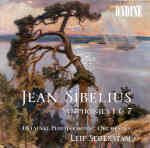Leif Segerstam recorded a strangely mannered, soft-edged Sibelius cycle for Chandos a few years ago with the Danish National Radio Symphony Orchestra, but his superb Sibelius recordings with the Helsinki Philharmonic (most notably a remarkable Four Legends) held out the promise that he could do better–and there’s no question that he certainly has. These are magnificent performances, very different from Osmo Vänskä’s stripped down, lean and mean approach. Rather, Segerstam takes a more traditional, Romantic view, but in knocking several minutes off his previous timings in the first symphony, and also a bit in the Seventh, he invests the music with the raw energy that it needs to make its most powerful impression.
Great recordings of the First Symphony remain strangely uncommon. Vänskä is terribly fast and his small string section doesn’t really do justice to the work’s richly scored lyrical moments (particularly in the slow movement and finale). Up to this point, the standout versions were Bernstein’s (Sony), Ormandy’s (Sony), Karajan’s (EMI), and surprisingly Ashkenazy’s (Decca). Segerstam certainly belongs in this elite company. He launches the first-movement Allegro with verve: bold brass and pounding timpani combine for a very impressive first-subject climax. Segerstam perfectly executes the transition to the second subject–and notice how effectively (at the end of the recapitulation) he judges the accelerando leading to the coda in slower tempo. So often this sounds mannered and pretentious, but Segerstam keeps enough momentum going so that the coda doesn’t sound like an afterthought.
The principal theme of the slow movement opens with some tiny hesitations in its phrasing, giving it a demure character that it quickly sheds as the movement progresses. It’s a lovely effect. Tight rhythms and excellent ensemble coordination typify the tricky scherzo, while the finale bids fair to be the most successful performance on disc. The allegro sections have all the necessary savagery, while the lyrical second subject has something of Ormandy’s voluptuousness (plenty of harp) at no sacrifice in intensity. It’s all of a piece in a movement that often comes across as patchy, and the final bars are remarkable: the brass rise up through the string textures like some terrifying musical monolith. In short, this is an unforgettable performance.
Segerstam’s view of the Seventh is no less effective or cogent. The opening adagio features luminous string playing, and the arrival of the principal theme on the trombone has that special, easy nobility of utterance that Sibelius made uniquely his own. Segerstam takes his time over the long transition to the scurrying Prestissimo but invests the music with so much characteristic detail and color (without killing the momentum) that he never actually sounds slow. And once the music takes off, watch out! The entire pastoral interlude breezes by with the necessary athletic momentum, and as with the First Symphony the transitions are something special. Segerstam’s keen ear and clarity of articulation invests the return to the tempo of the opening and its trombone theme, so often just a nebulous buzz of string tone, with a real sense of something important about to happen. The closing pages don’t linger unnecessarily, while the final “Amen” offers solemnity without exaggeration. Both symphonies enjoy superbly clear, rich recorded sound. This is a major Sibelius event. Ondine has waited long before venturing into these oft-recorded waters, and the wait has been worth it. [11/16/2002]
































